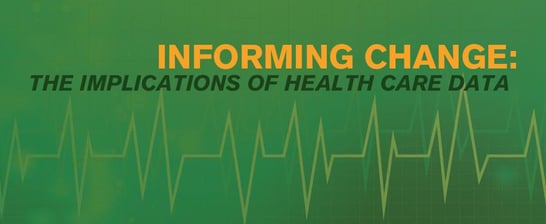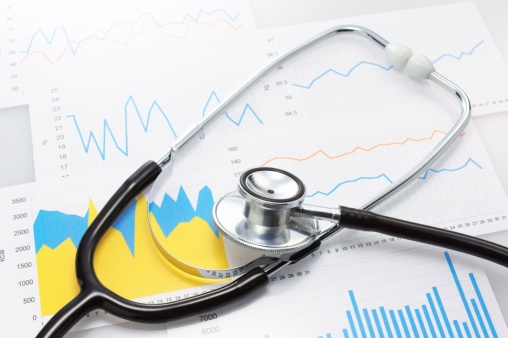
The digitalization of patient health information, whether medical records or insurance claims, began in earnest about a decade ago. It’s taken effort from health care personnel at all levels — as well as government mandates — to move the entire industry toward seizing the opportunity that the new influx of data offers.
How Big Data is Changing Health Care
“Big data” is a buzzword that companies across a variety of industries refer to when talking about their future plans. Health care companies are no different and are embracing the collection of big data to provide quality patient care and reduce costs.
What is Big Data?
IBM defines big data as “data coming from everywhere.” This encompasses everything from pictures and videos posted on social media to credit card transactions. Big data can help professionals improve practices and find opportunities for change. The ability to collect large amounts of useful data on patients offers a unique set of benefits for health care organizations.
Big Data and the Health Care Industry’s Future
From improving profits to avoiding preventable diseases, big data is becoming a powerful tool in every corner of the health care industry. A large portion of big data collection is happening in the pockets of patients, as smartphones and wearable devices like the Fitbit and Apple Watch have enabled people to monitor their own health. According to Forbes, the eventual goal is to make this data available to physicians and other health care providers. By compiling a patient’s data and comparing it to similar information from the general public, doctors may be able to identify preventable health problems.
Technology is allowing the health care industry to make data archived about patients over decades accessible. By digitizing medical and insurance records and pairing them with the new wave of data from sources like smartphones, doctors may be able to draw a comprehensive picture of a patient to improve the quality of care. The Pittsburgh Health Data Alliance is seeking to do exactly this and has become an example for how partnerships between medical and data professionals may work in the future.
Health care companies are also implementing big data in research and clinical trials, returning fascinating results. Big data can help researchers pick the best possible subjects for a clinical trial. Big data can also help measure how the trials are going, which could lead to breakthroughs in treatments for dangerous diseases like cancer.
How Legislation is Influencing Big Data in Health Care
Those who are searching for major medical advances may be embracing big data, but the health care industry as a whole has struggled to keep up with technology. Because of federal legislation, the American health care system is finally moving forward into the 21st century. Several laws have set standards and created timelines for the adoption of electronic health records (EHRs) and other technology.
The Health Information Technology for Economic and Clinical Health Act (HITECH)
The HITECH Act of 2009 was the most important piece of legislation related to the widespread adoption of health information technology (HIT), namely a nationwide network of EHRs. The law set aside $36.5 billion in spending to create this network and other measures to digitize health care information.
The law gave the Department of Health and Human Services (HHS) the power and authority to establish programs that promoted HIT use. With this power, HHS developed a national standard for the collection, storage and exchange of electronic health information. This process continues to change as security standards grow more and more strict.
The Food and Drug Administration Safety and Innovation Act (FDASIA)
Section 618 of the FDASIA legislation passed in 2012 allowed HHS and the FDA to develop strategies and recommendations for advanced HIT framework. The standards included information on the use of mobile medical applications, including the ones that are involved in the collection of big data. This framework was meant to promote innovation while still valuing the privacy of patients.
The Affordable Care Act
The landmark health care reform law included language designed to improve the overall operations of health care organizations. Providers are now incentivized to share data, which ideally will allow for easier collection of big data and faster adoption of EHRs.
How the Health Care Industry is Protecting Patient Data
As with the storage of any sensitive data, security is paramount in the field of health care data. And just as the collection and use of big data has grown exponentially, so has the need for professionals to secure it. Health care companies are facing several of the same issues that other major sectors of the economy are facing regarding IT security. They also must follow the Health Insurance Portability and Accountability Act (HIPAA), a federal law enacted in 1996 that protects patient privacy.
Data Breaches
Protecting health care information is far more difficult than financial information, according to
Jim Nelms, who is head of security at the Mayo Clinic and spent 14 years at the World Bank. The problem is that the health care industry hasn’t adopted secure IT practices at the same pace as other industries.
The Ponemon Institute found that 91 percent of health care organizations have experienced at least one data breach in the past two years. These breaches have cost companies more than $6 billion. The attacks are making patients open to identity theft and causing serious issues for the health care companies themselves.
Improving Health Care Data Security
For health care companies, simply continuing the growth and progress of digitalization will help have a strong effect on data security. As the health care industry gains a better grasp on how to properly secure protected health information (PHI), companies will be better suited to combat criminal threats. Many organizations have only recently begun hiring chief security officers to oversee these operations. As digitalization becomes the standard, the health care industry will need to focus on security just like other industries.
The Future of Health Care Careers
As health care companies implement the collection, sharing and protection of big data, both health care providers and administrators will need to understand how big data is affecting the industry. Health care leaders and IT professionals can gain the knowledge necessary to prepare for careers in the rapidly changing health care industry. Point Park University offers a fully online Master of Science in Health Care Administration and Management that allows students to maintain their current responsibilities while obtaining a credential they need to start a new chapter in their careers. Learn more today.






